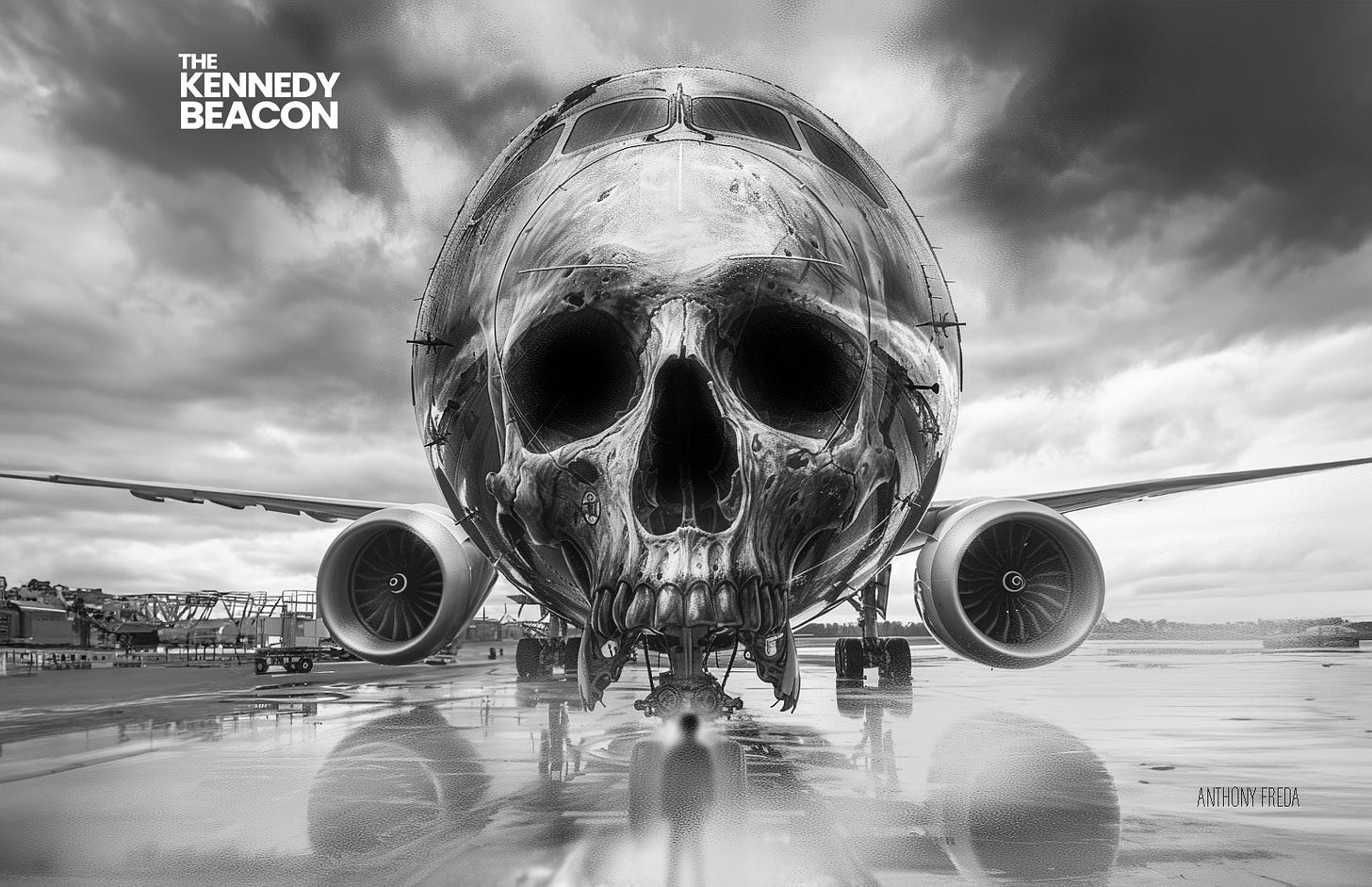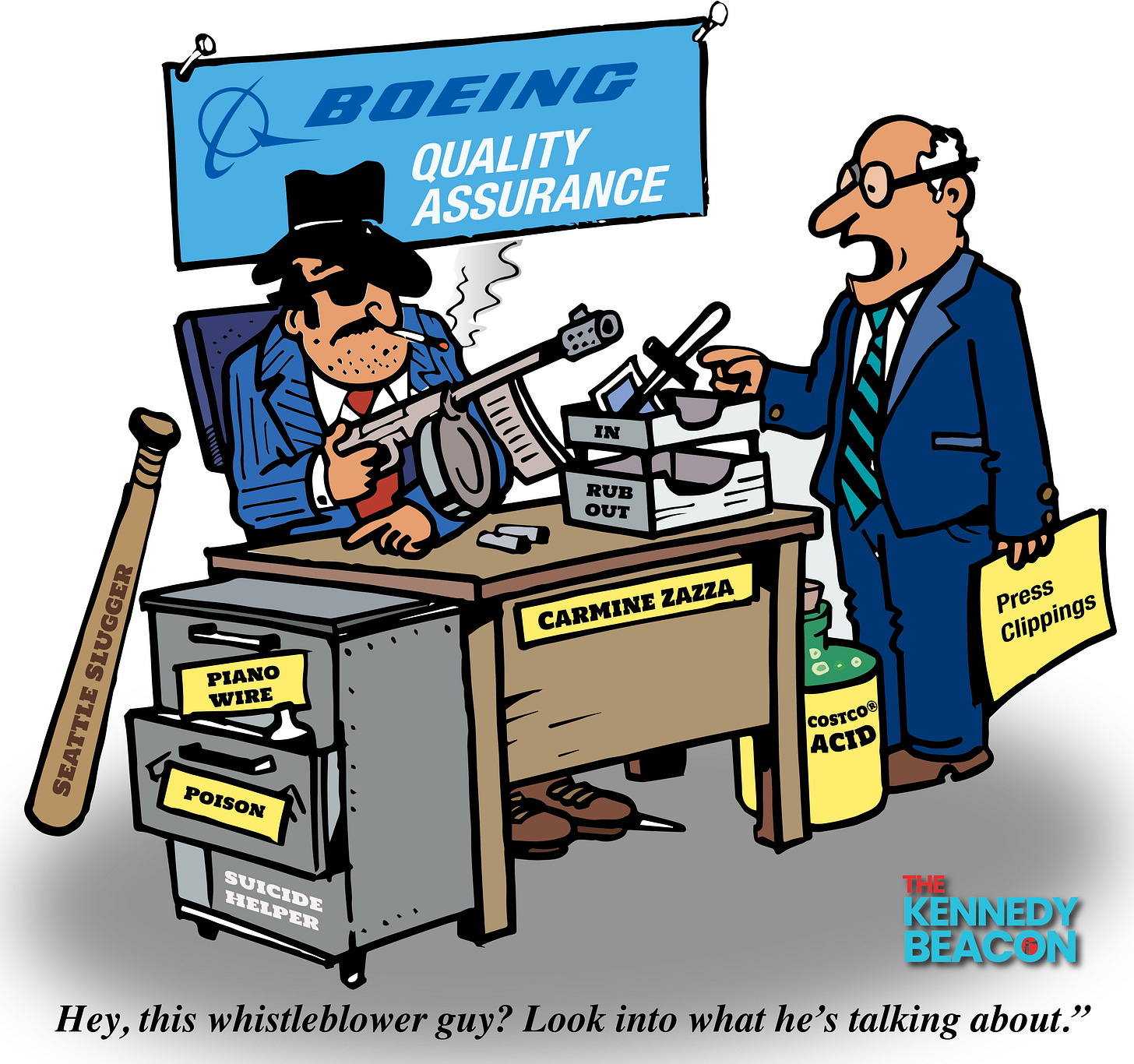What’s happening at Boeing is a crisis Robert F. Kennedy Jr. knows how to fix. The corporate capture of regulatory agencies that he calls out in the pharmaceutical industry and elsewhere is endangering lives by corrupting the systems intended to ensure the safe construction and operation of aircraft. In the wake of numerous Boeing equipment failures that have made headlines since January, the death of a whistleblower has led many airline passengers to question their confidence in the American aerospace industry.
One of the root causes of the ongoing scandals at Boeing is “corporate capture”: taxpayer-funded agencies neglecting or negating their duty of care to the public due to the corrupting influence of the corporations whose practices, products, and services they are responsible for regulating.
Methods used by corporations to “capture” regulatory bodies include aggressive lobbying, political donations to those who appoint people to agencies, and the resulting revolving door through which the same people and their associates undulate between positions on corporate boards and jobs at federal or state agencies. Stopping this corruption of federal regulatory agencies has been one of the centerpieces of Kennedy’s campaign.
Boeing Whistleblower’s Mysterious Death
On March 9, 2024, whistleblower John Barnett was found dead in a Dodge Ram parked outside the Holiday Inn Charleston-Riverview in Charleston, South Carolina, where he had been staying. Authorities became suspicious after Barnett failed to appear at a deposition where he was to offer statements against his former employer Boeing. Barnett’s lawsuit alleges that Boeing retaliated against him due to his whistleblowing activity, including through the degradation of Barnett’s good character.
While early reports called Barnett’s death an “apparent suicide” as a result of a fatal gunshot wound, his lawyers disagreed with this assessment.
Reuters reports that attorneys Robert Turkewitz and Brian Knowles said that Barnett “was in very good spirits and really looking forward to putting this phase of his life behind him and moving on. We didn’t see any indication he would take his own life. No one can believe it.” They added that the whistleblower “exposed very serious safety problems with the Boeing 787 Dreamliner and was retaliated against and subjected to a hostile work environment.” The attorneys said they intend to pursue Barnett’s existing claims against Boeing, even in the wake of Barnett’s unexpected death.
Turkewitz further said that Barnett planned to leave Charleston on March 8 so he could drive to his home in Louisiana. According to Barnett’s attorney, “He wanted to drive home to Louisiana starting that evening [March 8], as he had planned. He’d told his mom that he’d be home on Sunday, and it took him two days to drive home. I suggested that we break for a week or two. But the Boeing lawyers took the position that no more depositions could be taken until Barnett completed his testimony.” Turkewitz said that Barnett agreed, telling the press that Barnett conceded, “Let’s just get it done. I’ve already been waiting for seven years.” Barnett was found dead the next morning.
Barnett left Boeing in 2017 and came forward as a whistleblower in 2019, alleging that the company’s manufacturing environment was fraught with critical errors that were likely to endanger public safety.
Commenting on the unexpected and unexplained death of Barnett, independent presidential candidate Robert F. Kennedy Jr. posted on X:
John Barnett worked for Boeing for 32 years. The company worked to destroy his life after he exposed safety concerns. I’m proud that my sister Rory worked to tell his story in her award winning documentary Downfall: The Case Against Boeing. Boeing killed 346 people out of greed. Let’s hope there is a genuine investigation of John Barnett’s “suicide.”
According to local media, Charleston police continue to investigate the incident as they await a formal medical report on the cause of Barnett’s death. Early statements from police indicate that a firearm was found in Barnett’s lifeless hand when his body was discovered in the truck. Police also found a note in the passenger seat of the vehicle, but the contents of this note have not been released to the public. It remains unclear if the note had any connection to Barnett’s death.
Adding to the suspicion that initial reports of a suicide were false, a friend of Barnett, identified in the media only as Jennifer, told ABC News 4, Charleston, that Barnett specifically told her that his life was in danger due to the nature of his whistleblower testimony against Boeing. Jennifer said that Barnett told her he was not afraid, that if anything should happen to him Jennifer should know it was not suicide, and that would-be assailants might make Barnett’s eventual death look like suicide. Jennifer echoed Barnett’s attorneys in saying that the idea that Barnett took his own life is not credible.
According to press reports, hotel staff said that on the night before his death, Barnett ordered a quesadilla and Diet Coke and appeared to be happy. One Holiday Inn employee said, “I didn’t think of him at all until I heard the news the next day. He didn’t seem upset at all.”
Boeing’s Scandals and FAA Complicity
In the months before his death, Barnett spoke to the press about the current wave of safety scandals at Boeing, which began in January when an emergency door broke free from the fuselage of a 737 MAX 9 operated by Alaska Airlines. Since then, multiple in-flight incidents have occurred involving Boeing aircraft, including three in March alone.
Following investigations by the Federal Aviation Administration (FAA) into Boeing’s quality control, The New York Times reported that the company failed 33 of 89 safety audits. The FAA also found 97 instances when it failed to comply with its own best practices. Moreover, Boeing supplier Spirit AeroSystems failed 7 of 13 audits. According to the report, one Spirit AeroSystems employee used a discarded hotel key to test a door seal similar to the one that allegedly failed on the fateful Alaska Airlines flight in January.
In a process that began in 2004, the FAA has delegated many of its inspection responsibilities to aerospace companies. This process has been consistently criticized by unions, including the Professional Aviation Safety Specialists. By contrast, some of the strongest advocacy for the “self-policing” of safety and quality standards by aerospace companies has come from individuals with ties to both the FAA and aerospace companies.
One such advocate is Daniel Elwell, who served as deputy administrator of the FAA between 2017 and 2020. In 2012, when serving as vice president of the Aerospace Industries Association, he testified to Congress that the FAA’s delegation of many inspection and reporting duties to aerospace companies was a good way to speed up the process of certifying aircraft. The Aerospace Industries Association is comprised of the leading aerospace manufacturers in the country, including Boeing.
Following two deadly crashes of Boeing 737 MAX 8 aircraft between 2018 and 2019, many engineers came forward criticizing the FAA’s increasing reliance on companies to conduct their own safety inspections of aircraft, as reported in The New York Times. One such person who came forward at that time was John Barnett.
According to Barnett, beginning in 2012, Boeing “started removing inspection operations off their jobs” and implemented a system where mechanics were left to “buy off their own work” without a traditional oversight process. Not only had FAA inspectors been relieved of many of their traditional duties by then, but Boeing’s internal safety and quality checks were severely lacking, according to the now deceased whistleblower.
The Truth behind Misplaced Priorities
Boeing says it is fully cooperating with ongoing federal investigations into its quality control measures, yet National Transportation Safety Board chair Jennifer Homendy told the Senate Commerce Committee that Boeing overwrote the security surveillance video footage at the facility that repaired the plug on the emergency door of the Boeing 737 MAX 9 involved in the January Alaska Airlines incident. Homendy further said that Boeing CEO David Calhoun was personally “unable to provide that information and maintained that Boeing has no records of the work being performed,” as reported by ABC News.
While Congress and the president have been busy with legislation intended to ban the popular social media platform TikTok amid a political climate stifling free speech, comparatively little scrutiny has been applied to the corporate capture that has objectively put American lives in danger. This is more than a misplaced priority, it is the ultimate dereliction of duty and misuse of taxpayer dollars. Now, a whistleblower on a mission to tell the courts and the public about the internal problems at Boeing has been permanently silenced for reasons yet unknown.
Adam Garrie is a writer, speaker, and consultant on a wide range of current affairs as well as political risk. He is also the cofounder of HiCyrus, a data-driven tech startup that aims to fully democratize information access.







Everyone is blaming "Boeing" but this company is really McDonnell-Douglas which was a benchwarmer in the commercial airliner space. McD management were all beancounters and they ended up running Boeing and pushing the real company process out. We can look at the 80's where Reagan allowed stock "buybacks" which is basically insider trading and stock manipulation. Thats the SEC's job to stop this crap. The whole merger and using revenue to manipulate stock prices for management and shareholders is the real culprit. FAA is just another sad part of the story
Boeing is the poster child of America's decline.